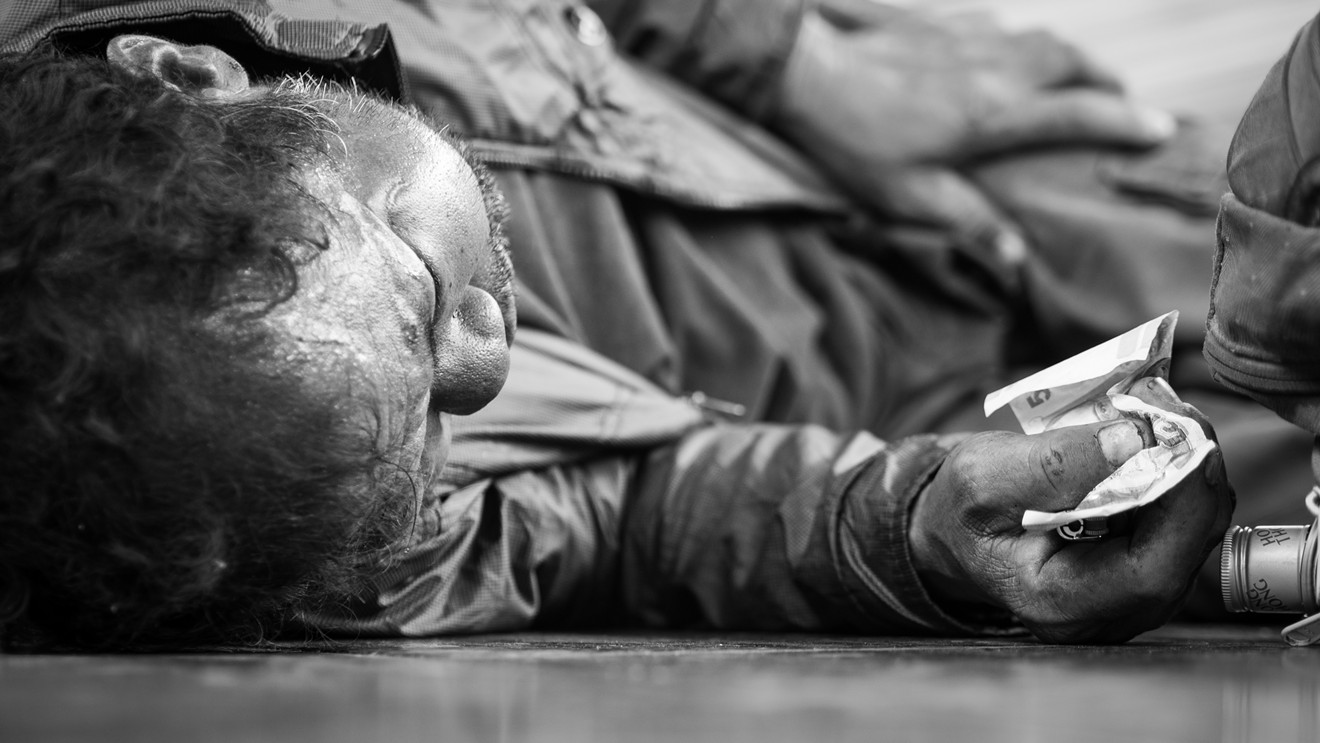As President-Elect Joe Biden prepares to take office, the question of whether America is going to go on a full lockdown to combat the out-of-control coronavirus pandemic is on everyone’s minds. If you have substance abuse problems, that prospect can feel very bleak considering how many coping mechanisms have been cut off during the outbreak.
Biden says he will not pursue a national lockdown, though that could still mean that hotspots will see one. Governor Greg Abbott has also vowed not to do a full lockdown in Texas. He seems confident the news about vaccines means the state can hunker down and ride out what’s left of the outbreak even as our infection rate blows far past his previous guideline to roll back re-opening.
Even if the government doesn’t return us to the empty streets of March, COVID has changed the way that we live and interact. These changes, while necessary to fight the spread of the disease, have been devastating to people with mental illnesses. It’s certainly not made being an alcoholic any easier.
I got sober nearly three years ago, and one of the things they teach you when you’re hospitalized for substance abuse is that staying alive with your condition is pretty much a part time job. It requires hours of extra work every week in order to maintain the physical and mental health necessary to combat the power of addiction recapturing your life.
One of these things is regular support group meetings like Alcoholics Anonymous (though if you’re like me and the religious aspect sticks in your craw there are alternatives). Now, there’s been a lot of research done about how AA is not really all that helpful in staying sober, and I’m not going to argue with any of that, but let me explain two simple facts that recovery numbers don’t tell you.
First, the 12-step groups are so popular because they are free and often nearly constantly available all over. If government social work on this issue operated the same way, there would be no need of AA, but since that isn’t happening anytime soon then the organization serves a population that otherwise would have nothing under a capitalist medical system often quite hostile to addiction. Second, having a social organ not based around drinking is pretty damned important to the newly sober. Isolation is a key component in a lot of addictions. Simply having someplace to go and people to be with can make fighting the disease easier.
A lot of that is out the window right now. I never really enjoyed church back rooms that smell like stale cigarettes and served coffee as acidic as alien blood, but just knowing that it was there was always calming. Now it’s largely not. Many groups have moved into Zoom or phone meetings as per AA’s own recommendations, but it’s not the same. Positive in-person interaction with people is one of the main producers of dopamine in the human brain, the chemical that quiets anxiety and panic. Addicts need those shots of dopamine because their substance abuse has conditioned their bodies to only produce it under the conditions of their substance. Retraining the body to feel normal is most of the battle, and we just don’t get those same fixes over an internet connection.
That’s important right now because COVID is having horrible effects on the nation’s mental health, especially the lockdown aspect. A Centers for Disease Control survey found that 40 percent of respondents reported symptoms of mental illness directly related to the lockdowns over the late spring and early summer, with 13 percent reporting increased dependency on substances. About 10 percent said they had suicidal ideation.
Right as addicts need their coping mechanisms, the coronavirus outbreak is taking them away. It’s not just support group meetings. When I was in the hospital a counselor told us that the number two indicator of continued sobriety a year after a stay was whether or not the person had maintained a regular exercise program. Exercise, like human interaction, is one of those things that helps the body produce dopamine.
Of course, you can work out from home or jog instead of going to the gym, but it’s yet another change and source of stress. The whole purpose of recovery is to put you in situations where you aren’t sitting at home alone brooding and making yourself vulnerable to a relapse. Gyms are open now in limited capacity, but if you or your immediate family is in the vulnerable population it becomes a gamble. Do you treat your disease while risking another potentially fatal one?
And that’s not even taking into account the fact that every place you might go is triggering as hell. When huge quantities of hand sanitizer started to be necessary for public safety, distilleries began producing it. That’s wonderful, but now the world is flooded with cheap disinfectant that not only smells just like vodka, but it also often comes in the same tiny bottles alcoholics on their way to rock bottom like to purchase. Early in the pandemic I bought one of these because it was all I could find. I had to throw it away after one use because all it did was make me want to lick my hands.
I’ve had so many friends reach out to me this year asking how they can get sober once the stress of the pandemic pushed them into addiction, and I am frustrated and heart-broken over how little I can give beyond a friendly ear. I can’t imagine being hospitalized for addiction right now, stuck in an indoor facility with dozens of people who might be infected. Any hobby that involves going other places is out of the question, and that’s if you’re not laid off and broke on top of it. AA and other groups are now cold, remote affairs, and every grocery store smells like booze. I can’t order a single bit of to-go food without someone telling me I can get an entire jug of liquor with my take-away, and every Spec’s billboard in Houston is screaming about their delivery options. Overly normalizing drinking was a problem before the outbreak, and now it’s coupled with the restaurant industry desperately pushing drinks on people to stay afloat.
It’s a really hard time to be an alcoholic. That’s not to say that social distancing or lockdowns shouldn’t happen. Over 250,000 people are dead, and whatever stops that is what needs to be done. However, you might want to check on your friends who drink or used to drink. They’re alone, scared, and under stress. Talking is about all they have left to keep the demons at bay. Until coronavirus is conquered, that’s going to continue, and some of us are not going to make it.
Support Us
Houston's independent source of
local news and culture
account
- Welcome,
Insider - Login
- My Account
- My Newsletters
- Contribute
- Contact Us
- Sign out

Check on your friends who drink or are in recovery.
Photo by Thomas Leuthard via Flickr
[
{
"name": "Related Stories / Support Us Combo",
"component": "11591218",
"insertPoint": "4",
"requiredCountToDisplay": "4"
},{
"name": "Air - Billboard - Inline Content",
"component": "11591214",
"insertPoint": "2/3",
"requiredCountToDisplay": "7"
},{
"name": "R1 - Beta - Mobile Only",
"component": "12287027",
"insertPoint": "8",
"requiredCountToDisplay": "8"
},{
"name": "Air - MediumRectangle - Inline Content - Mobile Display Size 2",
"component": "11591215",
"insertPoint": "12",
"requiredCountToDisplay": "12"
},{
"name": "Air - MediumRectangle - Inline Content - Mobile Display Size 2",
"component": "11591215",
"insertPoint": "4th",
"startingPoint": "16",
"requiredCountToDisplay": "12"
}
,{
"name": "RevContent - In Article",
"component": "12527128",
"insertPoint": "3/5",
"requiredCountToDisplay": "5"
}
]
KEEP THE HOUSTON PRESS FREE...
Since we started the Houston Press, it has been defined as the free, independent voice of Houston, and we'd like to keep it that way. With local media under siege, it's more important than ever for us to rally support behind funding our local journalism. You can help by participating in our "I Support" program, allowing us to keep offering readers access to our incisive coverage of local news, food and culture with no paywalls.
Jef Rouner (not cis, he/him) is a contributing writer who covers politics, pop culture, social justice, video games, and online behavior. He is often a professional annoyance to the ignorant and hurtful.
Contact:
Jef Rouner
Trending News
- Dan Patrick Sets Off Alarm Bells For Public School Advocates With His Property Tax Trial Balloon
- Texans DE Will Anderson Among Favorites to Win 2024 Defensive Player of the Year
- Rockets 2023-24 Report Card: The Starters
-
Sponsored Content From: [%sponsoredBy%]
[%title%]

Don't Miss Out
SIGN UP for the latest
news, free stuff and more!
Become a member to support the independent voice of Houston
and help keep the future of the Houston Press FREE
Use of this website constitutes acceptance of our
terms of use,
our cookies policy, and our
privacy policy
The Houston Press may earn a portion of sales from products & services purchased through links on our site from our
affiliate partners.
©2024
Houston Press, LP. All rights reserved.





